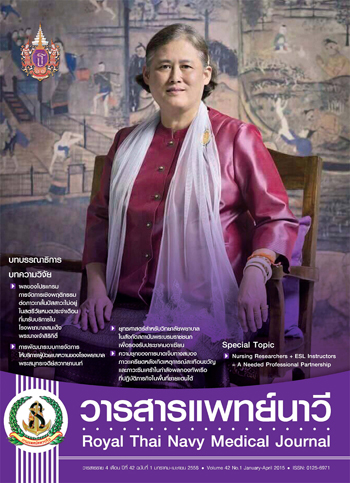ผลของโปรแกรมการจัดการเชิงพฤติกรรมต่อภาวะกลั้นปัสสาวะไม่อยู่ในสตรีวัยหมดประจำเดือนที่มารับบริการในโรงพยาบาลสมเด็จพระนางเจ้าสิริกิติ์
Main Article Content
Abstract
The purpose of this quasi-experimental one group pretest-postest design with 2 weeks,
4 weeks, 6 weeks, 8 weeks and 12 weeks follow up research was to examine the effect of
behavioral intervention program for urinary incontinence in menopausal women receiving
service from Somdejpranangchaosirikit hospital. The PRECEDE Model was utilized for a
study framework. Subjects consisted of 26 menopausal women with urinary incontinence
and were selected by purposive sampling from the “urinary incontinence in menopausal
women receiving service from Somdejpranangchaosirikit hospital”. Subjects received
the behavioral intervention program including urinary incontinence knowledge, pelvic muscle
exercise, bladder training, and reinforcement. The research instrument consisted of Severity
of Urinary Incontinence Questionaire, Pelvic floor muscle strength was assessed by using
The Urine Stop Test or The Urine Stream Interruption Test and record time of urine test by
Incontinence Impact Questionnaire. Data were analyzed using Repeated measures ANOVA
and Independent t-test.
Major findings were as follows:
1. The mean Severity of Urinary Incontinence in menopausal women at 12, 8 and
4 weeks from posttest were significantly lower than pretest (p <.01).
2. Pelvic floor muscle strength show the mean time of urine test in menopausal
women at 12, 8, 6, 4 and 2 weeks from posttest were significantly lower than pretest (p <.01).
3. The mean Impact of Urinary Incontinence in menopausal women at 12 weeks from
posttest were significantly lower than pretest (p <.01).


